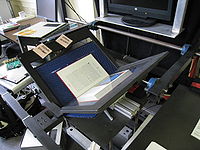Digitization

Digitization, which can also be called digitalization, is the process of taking something that is not a computer file and converting it into a digital or computer-readable format. It is like taking a picture of something with a camera, but instead of capturing an image, it captures data.
For example, let's say you have a drawing done on a plain paper without any colors, lines, or other special features. If you want to make a computer copy of that drawing, you can 'digitize' it by taking a photo of it using your smartphone or scanner. By doing this, you'll turn the drawing into a computer file with a digital image of the drawing.
Digitization is important because it makes it easier to store, share, and access information. Once something is digitized, it can be easily duplicated, sent across the world, and stored on a computer's hard drive. Digitization also prevents the loss of information that can happen over time when something is in physical form, such as when a piece of paper deteriorates.
Nowadays, digitization is applied to a lot of things, like photos, books, films, and even entire archives or collections. By digitizing the world's collections, they can be preserved for future generations, and access to them can be guaranteed.
For example, let's say you have a drawing done on a plain paper without any colors, lines, or other special features. If you want to make a computer copy of that drawing, you can 'digitize' it by taking a photo of it using your smartphone or scanner. By doing this, you'll turn the drawing into a computer file with a digital image of the drawing.
Digitization is important because it makes it easier to store, share, and access information. Once something is digitized, it can be easily duplicated, sent across the world, and stored on a computer's hard drive. Digitization also prevents the loss of information that can happen over time when something is in physical form, such as when a piece of paper deteriorates.
Nowadays, digitization is applied to a lot of things, like photos, books, films, and even entire archives or collections. By digitizing the world's collections, they can be preserved for future generations, and access to them can be guaranteed.
Related topics others have asked about:
